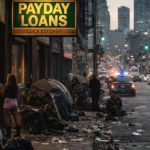![]()
Photo TIM SLOAN
There’s a thin line between a stranger’s ability to intervene in a chaotic situation and the societal requirement to look the other way.
In some ways, it’s always been this way. Our country was largely built on a “mind your own business and let me run my family the way I see fit” type of attitude that, in many situations, serves us well. However, over the last twenty years, there’s been a moral and spiritual fracture that’s left us in a uniquely dangerous position, especially for the most vulnerable among us.
There’s no denying that the U.S. has morphed into a low-trust society. The natural bonds of community — which would historically have framed the question of “when to step in” not as a matter of personal preference or fear of legal ramifications, but as a matter of objective duty rooted in the moral order — have been broken. While Americans used to agree that we protect the most vulnerable among us, no matter the potential consequences, there is now hesitation.
When families, churches, neighborhoods, and communities were strong, a child facing danger would receive an instinctive response from nearby adults. In large part, it was because everyone understood that without children the community would die, which created a sense of shared responsibility. This duty has been eroded by decades of moral decay, fracturing the American identity.
Parents possess primary and non-negotiable authority over their children, granted to them by God. Still, there are situations in which the community has to step in, most importantly when the good of the child, either for safety or grave harm, is being threatened.
When a parent or adult responsible for upholding the good of a child indisputably violates their moral responsibility through clear abuse like physical violence, sexual abuse, or other means, it is now the community’s duty to intervene. If you can stop a child from being beaten in a parking lot, you must. Silence in that moment is not respecting privacy or the adult’s authority. Instead, it is complicity in evil.
He was arrested by troopers around 12:30 p.m. on Tuesday on 12 counts of sexual abuse by parent, guardian or person in a position of trust, one count of sexual assault first degree, and one count sexual abuse first degree. https://t.co/YtOgvZYg3O
— WBOY 12News (@WBOY12News) November 26, 2025
And there are degrees to intervention. For example, no stranger has the right to usurp the parental authority over discipline style, tone of voice, or parenting philosophy. If you see a parent exhibiting minor rudeness or harsh words in public, like an exasperated mom yelling, shaming, or roughly grabbing her child’s arm, this rarely justifies a member of the community interfering. If the situation allows, a calm word or an offer of help may be acceptable. Otherwise, strangers must respect parental authority. The child is not in danger of anything here other than an attitude adjustment for bad behavior. Clear physical abuse when the parent goes from natural protector to predator is inherently different and requires immediate action.
These principles, which are lost today, seem like second nature to older generations because the America they grew up in held a uniform code of right and wrong that is no longer part of our current societal contract. Doors were left unlocked, neighbors borrowed tools without a signed waiver, etc., and all were a part of the sacred covenant that kept communities protected. That trust was the fruit of shared moral beliefs, grounded in a common understanding of right and wrong, reinforced by churches on every corner, schools that taught civics alongside math, reading, and science, and a cultural ethos that prized personal responsibility over perpetual victimhood.
We’ve squandered what used to be a beautiful society that promoted thriving families and community bonds. Decades of no-fault divorce, welfare statism that supplanted the extended family, and a media diet of sensationalized crime have fractured us into silos of suspicion. This erosion has been accelerated by the immigrant crisis, a policy failure of epic proportions, which had been happening for decades but ballooned under the Biden administration, forced upon Americans by threats of being accused of xenophobia. Instead of recognizing that communities thrive on familiarity, shared language, and mutual accountability, America’s heartland, where everyone knew everyone, was forced to accept millions of newcomers, many of whom, unlike immigrants in the past, are not willing to assimilate into the fabric of American culture.
No incident captures the reality of our low-trust society more starkly than the Nov. 5 shooting in Whitestown, Indiana, where 62-year-old homeowner Curt Andersen fired a fatal shot through his locked front door, killing 32-year-old María Florinda Ríos Pérez de Velásquez.
Ríos Pérez was a Guatemalan mother of four who had entered the wrong address while cleaning a nearby home. Andersen heard the alarming sounds of a possible home invasion, retrieved his gun, and shot Ríos Pérez in the head. Andersen was charged with voluntary manslaughter, a Level 2 felony carrying 10 to 30 years in prison. He claims the shooting was an act of self-defense.
NEW: A Whitestown homeowner accused of shooting and killing a cleaning worker who went to the wrong house made his first court appearance this morning.
Curt Andersen, 62, walked into court wearing a bullet proof vest and handcuffs linked around his waist.
During the initial… pic.twitter.com/RACErLx7yj
— Ashton Hackman WTHR (@ashtonhackmantv) November 21, 2025
While Ríos Pérez’s death is a tragedy, there are two victims in this case. In a different time, Andersen would have likely greeted Ríos Pérez with caution at the door rather than a gun. But our neglectful government, along with our decaying moral fabric, created a perfect storm that ended an innocent woman’s life and will likely see the sunset years of Andersen spent behind prison bars. (ROOKE: You Bet Your A** This Is Political)
This isn’t vigilantism run wild. It’s the logical endpoint of a low-trust society, where pressures collide with a culture of hyper-vigilance. We have successfully turned community members into dangerous strangers. Ríos Pérez’s death reminds us that when communities fracture into tribes of suspicion, the most vulnerable among us, whether they are screaming toddlers or innocent cleaners, are no longer protected.
The partnership of our once harmonious American culture, where stepping in for the weak wasn’t a risk assessment but a reflex of moral duty, has dissolved, and so has our capacity for mercy. Of course, the only way back from here is to lead a societal restoration by reviving strong-knit communities that promote cultural cohesion.











